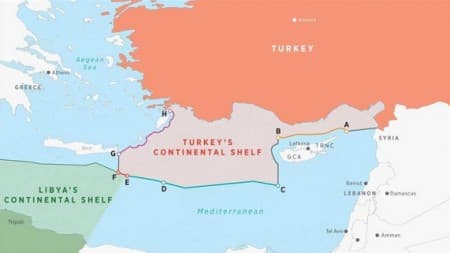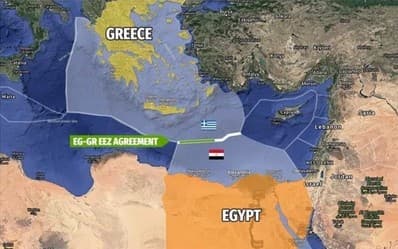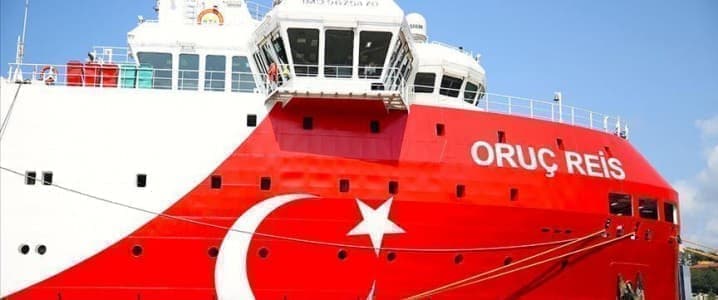When Turkey’s ruling Justice and Development Party (AKP) took power at the beginning of the century, the principle that got hold of the country’s foreign policy was called ‘zero problems towards neighbors’. It received praise domestically as well as abroad. Fast forward nearly two decades and there nearly isn’t a conflict in Turkey’s near abroad where the aspiring regional power is not involved.
The fundamentals of Ankara’s clashes were years in the making before a trigger unleashed the current tensions. Turkey risked missing out on the energy bonanza in the Eastern Mediterranean which a ‘sea-grab’ maneuver should have prevented. Instead, it created a chain of conflicts and an increasingly hostile environment for Turkish interests.
Besides the trigger, the reasons behind the animosity are historical and political. Greece's hostility is based on Turkey's imperial past and the illegal invasion of Cyprus that has split the island until this day. Ankara's support for the Muslim Brotherhood and opposition to President el-Sisi has sown the seeds of confrontation with Egypt. Furthermore, Turkey’s continued denial of the Armenian genocide has ensured bitter relations with another neighbor.
The trigger
The discovery of major gas deposits in the Eastern Mediterranean is a promise of wealth that wasn’t equally distributed. The geological conditions have primarily favored Egypt, Israel, and to a lesser extent Cyprus. The aggressive and unilateral actions of Ankara have backfired as the remaining littoral states are increasingly united in their actions.
Primarily Cyprus and Greece are disadvantaged due to Turkey’s claim that disregards international law and brings it in conflict with a fellow NATO member and two EU states. The illegal maritime deal Ankara signed with the government in Libya’s Tripoli is the latest proliferation of Turkey’s aspiration to gain at the cost of others. Related: Big Oil Forced To Change Strategy After The Oil Price Crash

Although it was Turkey’s initial goal to benefit from the massive energy wealth of the Eastern Mediterranean, the aggressive posturing has brought increased instability to North Africa and the Middle East. Turkish forces have entered the Libyan battlefield while certain sources claim that small numbers of the Egyptian army are deployed near Idlib to put pressure on Ankara.
An ideological battle
The military intervention in Libya was primarily motivated by the necessity to ensure the survival of the government in Tripoli which signed the maritime demarcation agreement. Turkey’s military success ensured warlord Haftar’s failure in capturing Tripoli and repelled his forces to the coastal city of Sirte.
The setback antagonized Egypt which was already locked in an ideological battle with Turkey over the latter’s support for the Muslim Brotherhood specifically and Islamic democracy in general. The parliament in Cairo recently approved the deployment of the army in neighboring Libya which would mark a serious escalation. Turkey, however, estimates that Egypt won’t risk getting involved due to the relative weakness of the army.
Syria’s growing role
Cairo is betting on multiple strategies to put pressure on Ankara without risking a confrontation in its direct neighborhood. Egypt’s assumed involvement in Syria, although minor, is a sign that Idlib could become a headache for Turkey.
Already several Arab states including Saudi Arabia, the UAE, and Egypt have been developing ties with the Syrian Kurds. According to sources, the Kurdish delegations to these countries were headed by SDF commander Mazlum Kobane. The military nature of the diplomatic contacts shows the willingness of the parties to halt Turkey’s involvement in Arab countries. Related: Russia Looks To Lure Shell Into New Arctic Oil Project
In addition, Cairo has been working on getting Syria to return to the Arab League. This would strengthen cooperation and coordination between Arab states in response to Turkey’s assertiveness in the region.
The Greco-Egyptian agreement
Ankara’s most recent moves in Libya and its illegal drilling activities in Greek and Cypriot waters have brought Athens and Cairo together. Greek Foreign Minister Nikos Dendias secretly flew to Egypt to seal a strategic alliance with Cairo, which apparently took 15 years to conclude. Recent events, however, accelerated talks and strengthened the need for a demarcation agreement. Obviously, Ankara was quick to declare the arrangement ‘null and void’.

Turkey is doubling down on its energy activities in the Eastern Mediterranean as another round of seismic research activities were announced in the disputed waters. Strengthened by a deal to keep refugees away from European shores and its indispensable strategic value to the West, Ankara feels that the EU and NATO eventually will cave to its demands. Therefore expect tensions to increase during the hot summer months as pressure mounts on all parties.
By Vanand Meliksetian for Oilprice.com
More Top Reads From Oilprice.com:
- Green Hydrogen Prices Are Set To Drop By 50% During The Next Decades
- Where Will Bakken Oil Go When Pipelines Run Dry?
- China’s Hunger For Crude Is Waning



















Turkey has three major energy objectives in the Eastern Mediterranean. The first is to become the energy hub of the European Union (EU). The second is to ensure a fair share of the gas riches in Cypriot exclusive economic zone (EEZ) for the Turkish Cypriots. The third objective is to prevent the construction of the proposed EastMed gas pipeline to transport Cypriot and Israeli gas supplies under the Mediterranean to the EU via the Greek mainland. Turkey opposes the EastMed because it could undermine its stated goal of becoming the energy hub of the EU.
However, if energy is Turkey’s only strategic interest in the Eastern Mediterranean, then here is my suggested solution which should satisfy all parties involved based on the following provisions.
The first provision is that the gas riches in Cypriot waters should be divided between the Greek and Turkish Cypriots on the basis of the size of the area each occupies in the Island. In return Turkey will cease exploring for energy resources in Cypriot EEZ.
The second provision is that Greece, Israel and Cyprus should forgo the proposed EastMed gas pipeline in favour of an 80-mile long gas pipeline connecting the Turkish Cypriot enclave with the Turkish coast where it will connect with existing gas pipeline carrying gas to the EU. Israeli and Cypriot gas exports could be exported to the EU via Turkey using the proposed Turkish pipeline.
The third provision is a settlement of the Turkish-Cypriot dispute over their overlapping EEZs in accordance of the UN Convention on the Law of the Sea (UNCLOS).
However, speculation is growing that energy is secondary to Turkey’s real strategic goal of making the whole Eastern Mediterranean as its sphere of influence as was the case under the Ottoman Empire. This is rooted in Turkey’s new regional foreign and security policy, based on its “Blue Homeland” Doctrine”.
This doctrine sets out an ambitious goal to underline and expand, through assertive diplomacy and military means, Turkey’s influence in the Mediterranean, Aegean, and Black Seas while enabling access to energy and other economic resources. President Erdogan adopted it in 2015 as an integral part of a national strategy of “forward defence”.
The lack of a robust and united transatlantic response to Turkey’s naval actions has emboldened Ankara to take further actions, particularly at a time when President Erdogan seeks to project independent power abroad and heightens nationalistic sentiment at home to distract the Turkish population from great economic difficulties.
Confronting Turkey’s aggressive naval moves could lead to the collapse of NATO or at least a serious weakening of the pact. But as Turkey’s economic situation deteriorates, engaging Turkey by offering it greater economic opportunities such as expanding the EU bilateral trade relationship with it and increasing foreign direct investment, might help bring Turkey back from risk of war in the Eastern Mediterranean.
Dr Mamdouh G Salameh
International Oil Economist
Visiting Professor of Energy Economics at ESCP Europe Business School, London